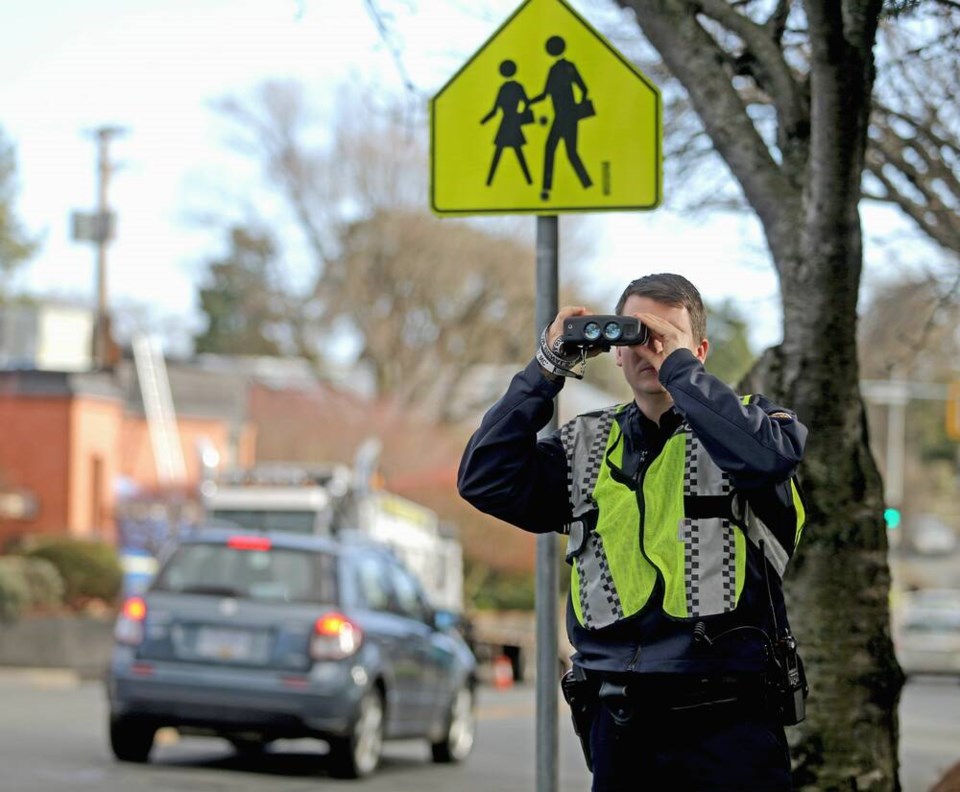It’s rare to see traffic laws enforced
I guess it’s good the Integrated Road Safety Unit (IRSU) responded after being tipped off about a large group of vehicles involved in street racing in the West Shore.
Could you imagine the public’s reaction had police learned of such recklessness but did nothing?
Yet outside of responding to specific incidents such as this, where large groups of motorists openly flaunt the law, nothing is done by police now, and drivers know it.
Every day throughout Greater Victoria the vast majority of motorists do one or more of the following:
- Speed;
- Speed excessively;
- Operate their cellphone while driving;
- Accelerate to beat an amber light;
- Fail to stop at stop signs (nearly no one fully obeys stop signs anymore);
- Fail to yield for a vehicle in a traffic circle;
- Fail to yield for pedestrians; and
- Fail to move to the right lane unless passing.
Motorists routinely break the law because sustained and effective traffic enforcement no longer exists, having long ago been replaced by targeted enforcement “blitzes” and finely crafted press releases about past incidents where police had no alternative but to investigate public complaints about driving behaviour so audacious that no police department could justifiably fail to respond.
Of course, this change in traffic enforcement posture prevailed because, despite traffic enforcememt having always been near the bottom of the police priority list, recent resource crunches made sustaining such dull work even less tenable.
Yet in spite of police phasing out routine traffic enforcememt as quietly as they could, the public noticed anyway, and responded as any reasonable person should expect: Drivers simply ignore the law where they feel they can get away with doing so (which these days means effectively everywhere).
So congrats to IRSU for doing the absolute minimum work required to evade both litigation and public castigation.
Among drivers who learn of this episode from radio, TV or a newspaper, exactly none will change their behaviour. Absent any meaningful traffic enforcement, why would they?
Doug Stacey
Esquimalt
We need the Greens now more than ever before
Re: “Green MPs threaten exit if leadership race suspended,” Sept 13.
At a time when the natural environment is proverbially and literally going to hell, and the need for sound green policies has never been greater, it is heartbreaking to watch the disintegration of the Green Party over frankly irrelevant issues such as the misgendering of interim leader Amita Kuttner.
It’s akin to the Titanic lifeboat staff going on strike, moments after hitting the iceberg, over wrong placement of the cutlery in the First Class restaurant.
Not since Brexit has an entity so needlessly self-destructed in such spectacular fashion. Had anti-Green elements planned to derail the party, they couldn’t have done it better.
We are well and truly doomed.
Jonathan Stoppi
Saanich
Mayoralty acclamations are not a good sign
Re: “Plenty of competition: 37 seek 8 council seats in Victoria,” Sept. 13.
It’s not difficult to see why the acclaimed and unopposed mayors of Sidney and Central Saanich conclude this situation can be attributed to a positive sentiment in the communities. That may be a reasonable explanation, but it’s not the only one.
The reality: Democracy is dying at the local level. Apathy is at an all-time high and has worsened since COVID. Another factor contributing to this is the lack of coverage by the local media.
The traditional media do not have the resources necessary to cover adequately the affairs in all the smaller communities, another cost associated with the fragmented political system in the Greater Victoria area.
We need more transparency and accountability. We need to find ways to encourage and engage the citizens in municipal affairs in the smaller jurisdictions.
Repeated acclamation of mayors from one election to the next is not a sign of a healthy democracy.
Carl Eriksen
Saanichton
Mulroney had two majority governments
Re: “Poilievre still faces the big test,” editorial, Sept. 13.
The editorial argues: “There have only been two occasions in the past 60 years when the Conservatives formed majority governments. Brian Mulroney accomplished that feat in 1984, and Stephen Harper in 2011. Yet both times the preceding Liberal administrations had overstayed their welcome, and the country wanted change. These are rare events.”
That is inaccurate.
In fact, Conservatives formed majority governments three times, not two. You seem to have forgotten that Mulroney’s Conservatives also won a majority in 1988, making him the first prime minister of any political party to win back-to-back majorities in 35 years and the only Conservative leader to have done so in 100 years.
I note also that both of Mulroney’s governments were national governments with substantial representation in every province.
Michael O’Shea
Donnacona, Que.
A loss of democracy on the south Island
As south Islanders prepare for municipal elections, please try and take a moment of silence as we acknowledge the loss of regional democracy where an electorate representing 87% of the local population voted 75.1% in favour of an amalgamation review.
The B.C. NDP stand alone in Canada in sabotaging local democracy, where we effectively have trapped populations in Greater Victoria who have no voice in how they are governed.
Other provinces tell me such actions would not be possible as their governments exist to serve the democratic wishes of the populace where the same ballot box that gave them their jobs reigns supreme.
John Vickers
Miramichi, N.B.
SEND US YOUR LETTERS
• Email letters to: letters@timescolonist.com
• Mail: Letters to the editor, Times Colonist, 201-655 Tyee Rd., Victoria, B.C. V9A 6X5
• Submissions should be no more than 250 words; subject to editing for length and clarity. Provide your contact information; it will not be published. Avoid sending your letter as an email attachment.



